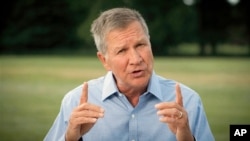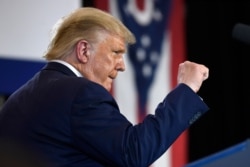John Kasich, the former Republican governor of Ohio, crossed party lines on Monday to speak at the Democratic National Convention in support of presumptive Democratic presidential nominee Joe Biden.
“I’m a lifelong Republican, but that attachment holds second place to my responsibility to my country. That’s why I’ve chosen to appear at this convention. In normal times, something like this would probably never happen, but these are not normal times,” Kasich said in his prerecorded speech on the opening night of the four-day Democratic Party convention.
Kasich, who was one of President Donald Trump’s toughest rivals for the 2016 Republican presidential nomination and was the last to drop out of the race, is perhaps the most prominent Republican to both oppose Trump’s reelection and support Biden.
His speech, while clearly welcomed by the Biden campaign, was dismissed as self-serving and disloyal by some conservative Republicans. Even a few progressive Democrats complained Kasich was being given an undeserved spotlight on the first night of the convention.
Anti-Trump conservative
A lifelong Republican, Kasich was an unbending, brash conservative when he served as a congressman in the 1990s. He became House Budget Committee chairman under Republican Newt Gingrich, the former Speaker of the House of Representatives, and engaged in contentious negotiations with then-Democratic President Bill Clinton to enact welfare reform, tax cuts and a balanced budget.
Kasich was also a supporter of the Tea Party movement in 2010 that opposed former Democratic President Barack Obama’s effort to expand Medicaid, a government supported health care program for the poor.
Later, as a two-term governor of Ohio, Kasich pivoted to a more moderate and practical stance, compromising with the opposition to get legislation passed and ultimately agreeing to expand Medicaid in his state.
Kasich has been a frequent critic of Trump’s America First policies, especially protectionist trade practices, restrictive immigration regulations and what he called the president’s “divisive” tactics that have heightened political polarization in the country.
Kasich supported President Trump’s impeachment for allegedly holding up aid to Ukraine to get political dirt on Biden and his son, Hunter Biden. Trump was ultimately acquitted of the charges in a Senate trial that ended Feb. 5.
In 2016, Kasich said he did not vote for Trump, but could not support Democratic nominee Hillary Clinton either. Instead, he cast his vote for former Senator John McCain of Arizona, who was the 2008 Republican nominee. McCain died in August 2018.
At the opening of this week’s Democratic convention, Kasich along with other disaffected Republicans -- former New York Congresswoman Susan Molinari, former New Jersey Governor Christine Todd Whitman and Meg Whitman, CEO of Quibi -- came to express support for Biden and try to persuade other Republicans to also cross over to vote for the Democratic candidate.
“I know that Joe Biden, with his experience and his wisdom and his decency, can bring us together to help us find that better way,” Kasich said.
The Lincoln Project, an anti-Trump, Republican-led political action committee, has also released ads supporting Biden’s campaign.
“They're more or less creating this permission gateway for Republicans to feel OK about not voting for the Republican nominee,” Republican strategist Rob Stutzman said in an interview with VOA.
No Republican has ever won the presidency without winning Kasich’s home state of Ohio. In the 2016 general election, Trump won Ohio by more than 8 percentage points over Clinton. Recent polls in Ohio indicate a very close race with Biden and Trump within 1 or 2 percentage points of the other.
Kasich’s Critics
The Trump campaign has downplayed Kasich’s defection, and critics say Kasich is driven by his future presidential ambitions.
"Did he ever stop running for president? Did he officially drop out in 2016 or is he still actually running?" conservative talk show host Ben Shapiro asked during a recent interview with the Associated Press.
Barry Bennett, a Republican consultant who worked for multiple Ohio Republicans, described Kasich as an “unemployed politician desperately seeking audience,” in an interview with the newspaper Roll Call.
Some progressive Democrats, however, were also upset that the conservative Kasich, who supports abortion restrictions and opposes their expansive agenda to establish universal health care and increase economic assistance programs, was given a prime time speaking slot at the convention.
Democratic Congresswoman Alexandria Ocasio-Cortez, a rising progressive star in the party who only was given one minute to speak at the convention, on Monday tweeted that while Kasich is welcome to voice his support for Biden, “a Republican who fights against women’s rights doesn’t get to say who is or isn’t representative of the Dem party.”
Political crossovers
While rare for a prominent party leader to speak at an opposing party convention, it is not unprecedented.
Then-Democratic Senator Zell Miller of Georgia endorsed President George W. Bush’s re-election at the Republican National Convention in 2004.
Then-Senator Joe Lieberman from Connecticut, who had been the Democratic vice presidential nominee in 2000, spoke at the Republican convention eight years later to support Senator McCain.
And in 2016, Michael Bloomberg, who had been a Republican mayor of New York City, gave a speech at the Democratic National Convention supporting Hillary Clinton.







